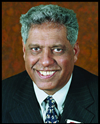
He started his academic career with a Bachelor of Arts degree in Political Science at Wits. At the University of Sussex, he completed a Master of Arts in African Politics as well as his PhD in History. The title of his thesis was "The Development of Indian Political Movements in South Africa 1924 - 1946."
His political career began in 1958 when he became a member of the Transvaal Indian Youth Congress. In 1962 Pahad was arrested for organising an illegal strike, following the banning of the African National Congress. In December 1964, Pahad was banned for five years and went into exile. While in exile, Pahad became more actively involved with the ANC and the SACP. He represented the SACP on the editorial council for the World Marxist Review.[2]
After the 1994 democratic election, Pahad served as the Parliamentary Counsellor to then-Deputy President Thabo Mbeki. He was appointed as the Minister in the Presidency after the 1999 general election.
After Mbeki's resignation as President of South Africa, Pahad submitted his resignation as Minister,[3] in addition to resigning from his seat as an ANC MP
His political career began in 1958 when he became a member of the Transvaal Indian Youth Congress. In 1962 Pahad was arrested for organising an illegal strike, following the banning of the African National Congress. In December 1964, Pahad was banned for five years and went into exile. While in exile, Pahad became more actively involved with the ANC and the SACP. He represented the SACP on the editorial council for the World Marxist Review.[2]
After the 1994 democratic election, Pahad served as the Parliamentary Counsellor to then-Deputy President Thabo Mbeki. He was appointed as the Minister in the Presidency after the 1999 general election.
After Mbeki's resignation as President of South Africa, Pahad submitted his resignation as Minister,[3] in addition to resigning from his seat as an ANC MP
 Déclaration Skhirat (Fr)
Déclaration Skhirat (Fr)